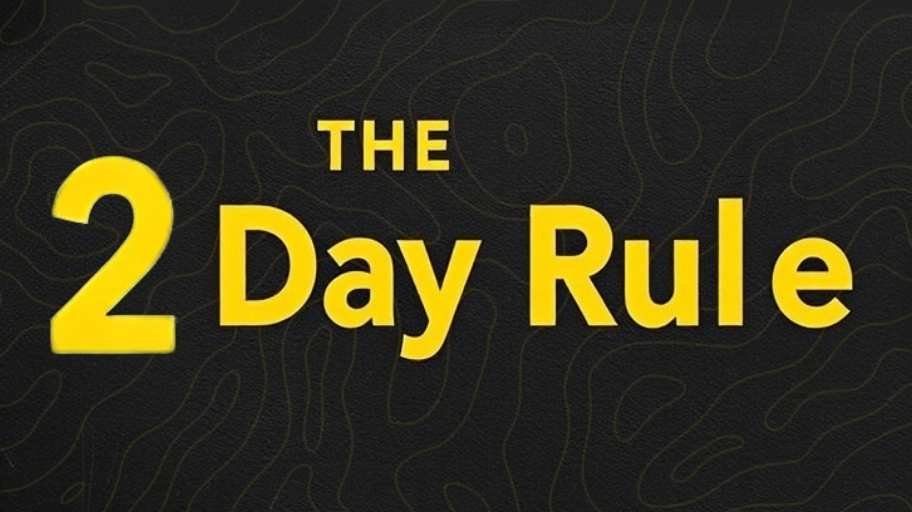I will keep this one honest like a real practice, not perfectly staged Instagram post. The 2-Day Rule is stupidly simple and quietly brutal that mean don’t let yourself skip the same habit two days in a row. Miss one day? no problem. Miss two? and you’ve invited momentum to leave the building.
People saying the same thing in different ways:
“never miss twice”
“shrink it to two minutes”
“start for five minutes”
“stack it onto something you already do”
And even a version where you use two days to test a decision. I stitched those voices together because they’re saying one useful thing: build systems that forgive you, nudge you, and don’t make failure feel like a cliff.
Why the 2-Day Rule works
The rule catches two weak but predictable enemies: guilt and inertia. If you miss one day you’re allowed to be human. If you miss two days, your not doing starts to feel like the new normal. That switch where doing becomes the exception and not doing becomes the default is where habits collapse.
There’s also a practical trick behind it: reduce the barrier. James Clear’s version says shrink the habit to the smallest repeatable unit (one push-up, one page). David Allen’s thinking the 2-minute rule says do small, immediate tasks at once so they never stack and weigh you down.
How to use it in real life
- Pick one habit to protect with the 2-Day Rule. Dont try to guard every single thing at once. Treat this like a perimeter you patrol one door at a time.
- Make the fallback small. If work out is the habit, your fallback is not a full session it’s put on sneakers or do one set.
- If it’s writing, your fallback could be open the doc and write one sentence. Usually, once you start you do more. 5 minute rule & 2 minute rule are the same mechanic in my opinion like start small, momentum carries you.
I used to let a missed day turn into a week. Then I began treating one miss like an expected hiccup.
I would tell myself: Okay, missed day. Tomorrow I will do five minutes. Most days the five minutes turned into a proper session.
When to bend the rule
Life happens. The 2-Day Rule is about preventing slippage, not shaming yourself for rest. If you’re legitimately exhausted, sick, or grieving, skip without the guilt but plan a gentle, low-bar comeback. Use the off day to prep the environment for the next day.
| Missed 1 day | Comeback |
|---|---|
| Workout | Put on shoes and do one set or 5 minutes |
| Writing / Reading | Open the file and write one line or read one paragraph |
Rules to remember
- Make the fallback so small you can’t possibly argue with it.
- Attach the habit to something you already do

How it plays
There’s a whole family of small habit tools that play well with this rule: decision minimization (prep clothes, meals, workspace), trigger stacking (attach a new habit to an existing one), weekly course correction (a short Sunday check-in), and small-time starters 2-minute / 5-minute starts.
Problems and how people solved them
People often complain the 2-minute or 2-day ideas are too small or feel pointless. Two responses that actually help: batch the small tasks when they truly pile up (don’t let a day of 2 minute tasks become a four-hour job because you never handled them), and use elastic versions of habits mini / plus / elite so you can scale the expectation up or down without the whole thing collapsing.
Weekend and rest notes
If your life needs real recovery, never miss two days for habits still works but be explicit about what counts as a habit day. Many people find weekends feel eaten by chores; treat one weekend day as cleaning/errands, one day for recovery, and sprinkle the habit (even if small) into the recovery day so you don’t lose the thread entirely.
My opinion
I’m not into perfection. I like rules that are forgiving and require the least possible moralizing. The 2-Day Rule made me stop catastrophizing one missed session into abandoning a whole month. My practical move was always the same: accept the miss, set a 5-minute plan for tomorrow, and do one preparatory thing tonight lay out the kit, set the alarm, or open the doc. That small prep removes the friction and many times I finished way more than the small quota I gave myself.
FAQs
Q: What if I miss two days anyway?
A: Don’t weaponize shame. Treat it as data. Ask why it happened, shrink the habit more, change the trigger or the time, and try again. Write down one small adjustment and commit to the next day.
Q: Does the 2-Day Rule mean daily habits are unnecessary?
A: No it’s not an excuse to be flaky. It’s a forgiveness hack to keep momentum. Daily practice is great, but reality sometimes forces gaps. The rule stops a gap from becoming resignation.
Q: How does decision-making fit with the two-day idea?
A: There’s a separate 2day decision tactic where you try each option for a day to live with it before committing. That’s useful for choices, while the 2-Day Rule for habits is about avoiding consecutive skips. Both are about testing and reducing regret.
Q: What if the small start never snowballs into a full session?
A: That may mean the habit isn’t compelling or the timing is off. Try a different anchor, swap times of day, or make the required action even smaller. If it still never grows, it may be fine to let that goal go and focus the rule on something you care more about.
If you want to try it right now
Pick one habit. Decide the absolute tiniest version of it.
Commit: I will not miss this twice in a row. If you miss, own it, do the small thing next, and give yourself permission to sputter just don’t let the sputter become a lifestyle.




